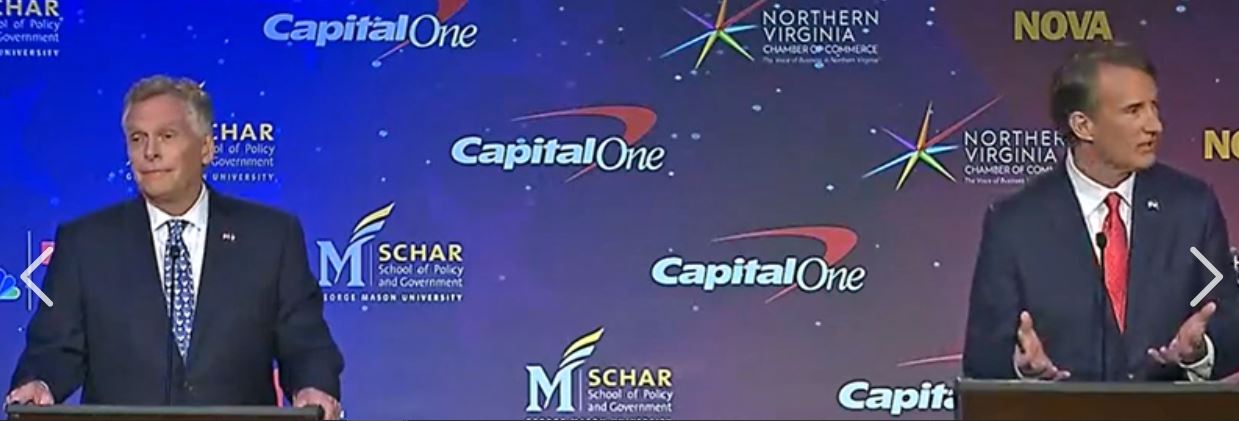
by Kerry Dougherty
No one who knows my political leanings would expect me to watch a debate between Glenn Youngkin and Terry McAuliffe and declare the Democrat the winner.
And I’m not going to do that.
But I was worried before the cameras rolled. I’ve met McAuliffe. I’ve seen him work a room. The guy Larry Sabato once dismissively called “a bag man for the Clintons” can be rather charming.
That Terry McAuliffe was not on stage last night.
In his place was a man who was positively Nixonian: angry, dour and rude. He engaged in name-calling – repeatedly calling Youngkin “clueless” – and yapped incessantly about Trump.
Youngkin was ready for the tedious Trump tropes.
“You’ve made some people in Las Vegas very happy tonight,” Youngkin quipped after McAuliffe invoked Trump’s name repeatedly during one long diatribe. “There’s an over and under tonight on how many times you’re going to say ‘Donald Trump’ and it was 10. You just busted through it.”
“Let’s have Terry McAuliffe versus Glenn Youngkin and let Virginia voters decide who they want the next governor to be,” Youngkin suggested.
McAuliffe turned off the charm last night and turned on the attack. He tried his best to make Youngkin look like a far-right “tin-foil hat” candidate, but it didn’t work. Where McAuliffe was angry and emotional, Youngkin was poised, reasonable and most importantly, well-prepared.
But it was a question on schools where McAuliffe — who’s raking in money from teachers unions — blurted out something that will undoubtedly appear in Youngkin ads before the week is out.
In response to a question on schools, Youngkin said, “I believe parents should be in charge of their kids’ education.”
McAuliffe retorted: “I don’t think parents should be telling schools what they should teach.”
Great sound bite.
News flash, McAuliffe: School boards, like other government entities, are elected by the people. (In most Virginia jurisdictions, anyway.) By definition they answer to the voters. Parents have a stake in what’s taught in the schools and school boards have a duty to listen to them. As much as teachers unions might prefer for school boards to operate as untouchable star chambers, they are not.
Oh, and as the Youngkin campaign was quick to point out after the debate, McAuliffe really ought to familiarize himself with the Code of Virginia 1:240.1:
Rights of Parents.
“A parent has a fundamental right to make decisions concerning the upbringing, education and care of the parent’s child.”
All across Virginia, from Virginia Beach to Loudoun County, parents are being shut out of school board decisions and they’re not happy about it.
These folks vote.
As expected with left-leaning Chuck Todd as moderator, the questions were intended to trip up Youngkin.
Case in point: Youngkin was asked if Trump is the Republican candidate for president in 2024 would he support him. Answer, yes.
Odd, Todd didn’t ask McAuliffe if he’d support Alexandria Ocasio-Cortez if she’s the Democrats’ choice.
(It’s a miracle any Republican ever agrees to a debate. One of the panelists, a George Mason University associate professor, pulled out of the debate panel after it was revealed that he’d called Republicans racists on social media.)
At the end of the hour-long debate, each candidate was given a minute to close.
Youngkin was optimistic, almost Reaganesque, as he invoked Washington, Madison, Jefferson and Mason and asked voters to help him build back Virginia together.
Then it was McAuliffe’s turn. He continued with the histrionics, attacking Youngkin as a Trump wannabe and he falsely accused him of wanting to ban abortion and gay marriage.
That’s when it hit me. There was one candidate on stage exhibiting the exact sort of blowhard behavior that eventually doomed Donald Trump.
And it wasn’t Youngkin.
This column has been republished with permission from Kerry: Unemployed & Unedited.

Leave a Reply
You must be logged in to post a comment.